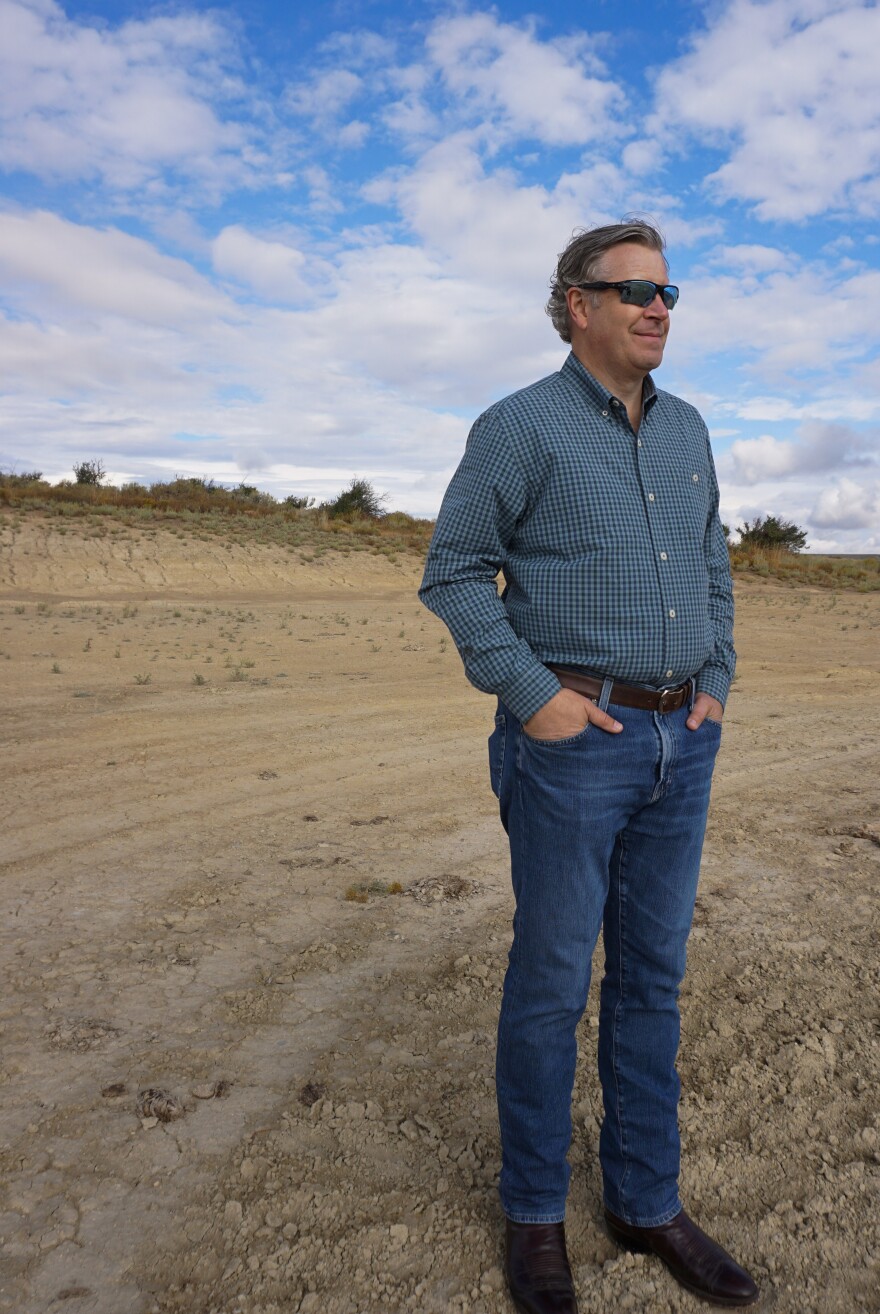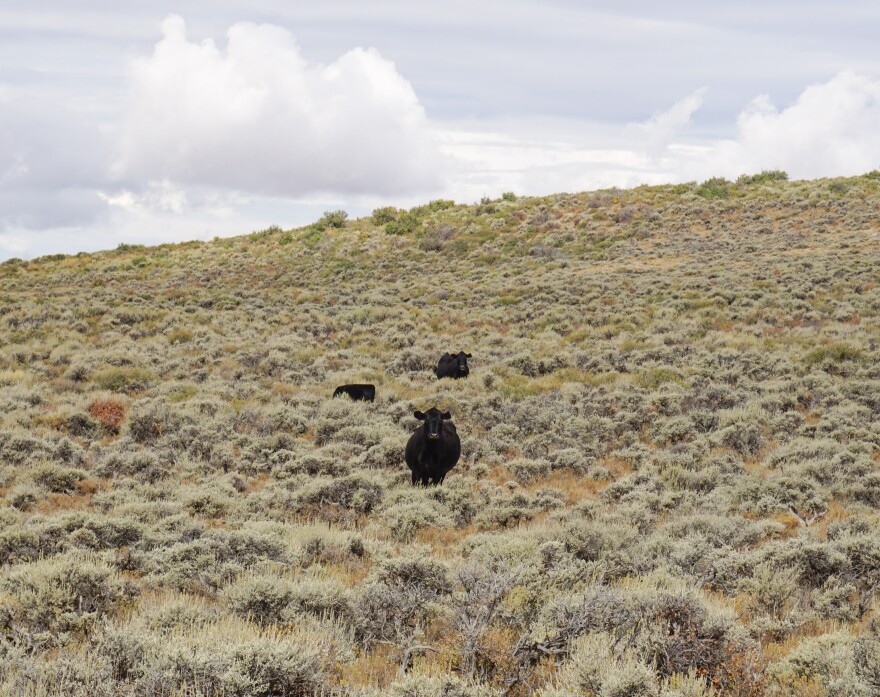Stocky black cows grazed amid yellow flowers in southwest Wyoming. The rolling foothills could soon be home to a massive new AI data center from the company Prometheus Hyperscale.
“ I spent most of my summers in Wyoming riding north of the interstate here, moving cattle,” said Trenton Thornock, the founder and CEO of Prometheus.

His family has been ranchers on this land for six generations.
Thornock left for a career in finance, but now he has a new way to make money here: building data centers in the wild West. And he’s also finding ways to power them.
“So right here, we're measuring the amount of sunlight that we get during the day,” Thornock said, pointing to a weather station at the site near Evanston, Wyo.
That station is finding the best angle for solar panels, if potential big tech customers like Google, Meta or OpenAI want them.
“If you look this way along the ridgeline, you’ll see another big row of wind turbines,” Thornock said.
It’s the second nearby wind farm he’s pointed out.
“We sit right in the middle of all of this renewable energy infrastructure,” he said.
“Sustainable infrastructure for the age of AI” is Prometheus' tagline. But sustainability isn’t simple at the company’s flagship center. It will produce all its own power, recycle its water, use efficient cooling systems, and even use heat from whirring servers to grow microgreens and farm shrimp.

But Thornock said the data center won’t just run on renewable energy.
“You’ve got gas pipelines on both sides for natural gas generation,” he said.
The bulk of its energy — at least for now — is slated to come from fossil fuels and natural gas, which is abundant in Wyoming.
In the long run, Thornock wants to transition to small modular reactors, which are like mini nuclear plants. The industry is abuzz over those. The Trump administration is even trying to fast-track their development, with some at the Idaho National Lab. But the tech is still a ways off.
So why not use wind and solar to fill the gap? Because Prometheus says it’s expensive.
“A thousand megawatt wind farm does not provide the same capacity as a thousand megawatt coal plant or a natural gas plant,” said Mary Throne, general counsel for Prometheus.

She questions the reliability of renewable energy for data centers. Some need as much power as a small city, and they need to be powered 24/7.
“We really need to be more forward-thinking and more open to taking advantage of all sources of energy,” Throne said. “Technology is our friend.”
That includes technology like carbon capture. That’s how Prometheus plans to achieve net zero energy.
Since Prometheus plans to use natural gas, it’ll pay another company, Frontier Infrastructure, to offset its emissions. Frontier will transport liquid CO2 from ethanol plants in the Midwest to Wyoming, then inject it into the ground about 60 miles from the data center.
But, according to Amory Lovins, this isn’t very “high quality sustainability.” The Stanford professor is the founder of the nonprofit Rocky Mountain Institute, which promotes clean energy.
“It sounds like a pretty sketchy model,” Lovins said, sitting in what looks like a jungle, a solar banana farm in his Aspen, Colo., living room.

Lovins said carbon capture data isn’t always trustworthy, though Prometheus says its credits will be third-party certified.
“It's a lot more straightforward to make your own clean power on site,” Lovins said.
Plus, he said power sources such as solar and wind can be reliable if you pair them with batteries, and he said they can be more affordable in the long run. He pointed to a data center outside Reno, Nev. It runs on solar and used electric car batteries.
“So, I don't think you need to mess with offsets if you're making the power right in the first place,” Lovins added.
But, as cows mooed at the Wyoming site, Thornock said Prometheus will still build the first net-zero data center. He said other companies do things like plant trees in the Amazon, far from where they’re emitting carbon.
“It's maybe a little bit of a harsh critique, [but] it's greenwashing,” Thornock said. “So. they're trying to portray themselves as being green, but they're not actually consuming the green energy.”
He said Prometheus isn’t greenwashing since its methods will be “certifiable and auditable. He said he sees himself as a steward of the sagebrush-covered land.
“We've been here for generations,” Thornock said.

The name Prometheus comes from Greek mythology and means foresight.
“We hope to be here for many more generations and my nephews and nieces will someday inherit the ranch.”
Although they may find themselves to be data wranglers, rather than cowboys, in the decades to come.
ABOUT OUR WIRED, WIRED WEST PROJECT
Data centers are booming across the Mountain West as big tech moves to solve its AI storage problem. Nondescript, square, warehouse-type buildings are popping up in neighborhoods, open plains and rolling foothills. The burgeoning industry leaves many communities grappling with the prospects of increased air pollution, dwindling water supplies and higher utility bills. All this even as climate models predict more heat, drought and other weather extremes across the Mountain West.
Read the entire series here.
The Mountain West News Bureau is a collaboration between public media stations in Arizona, Colorado, Idaho, Nevada, New Mexico, Utah and Wyoming along with NPR.







